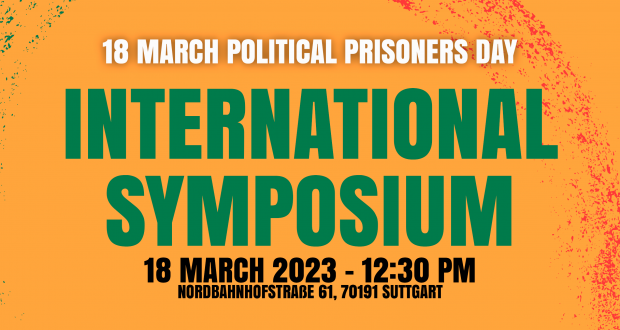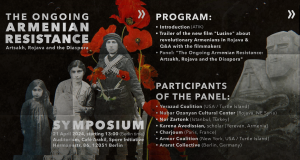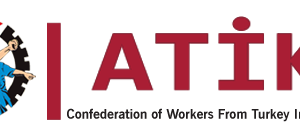ATIK-UPOTUDAK organized an international symposium in Stuttgart, Germany, on March 18, the International Day of Solidarity with Political Prisoners, with participants from the Philippines, Iran, Palestine, Kurdistan, Germany, Switzerland, and Turkey. The opening speech of the symposium, which was organized under the slogan “Freedom for political prisoners,” was made by the Co-chair of the Confederation of Turkish Workers in Europe.
After the opening speech, participants from Iran, the Philippines, Palestine, Turkey, and Kurdistan made presentations on the problems faced by political prisoners in prisons in their countries, as well as the general political atmosphere in these countries. The report sent by Peru, which could not attend the symposium at the last minute, was read.
“The regime in Iran has been massacring people since 1979.”
Giving information about the situation in Iran, where a significant wave of rebellion took place and continues after the murder of young Kurdish woman Jina Mahsa Amini by the police in October 2022, the participant stated that the current regime has been in power for 43 years by destroying those who oppose it and that women are the first to be targeted in this process. She gave examples of the problems faced by women, such as “the implementation of the headscarf rules, the reduction of working hours, the application of Sharia law in divorce and child custody cases.”
The participant listed the points that differentiate Iran from other countries in terms of political prisoners as follows:
the lack of official and legal recognition of political prisoners,
lack of a proper registration system in the judicial process,
the absence of a legal process and definition of detention,
the absence of a specific organization in the security forces responsible for political prisoners,
lack of accountability towards prisoners,
absence of any organized initiative for the disappeared,
no precise information on the number of prisoners,
lack of a proper death record of murdered prisoners,
the existence of mass graves of an unknown number.
In Iran, there is no control mechanism in the process from detention to arrest and even execution.
In the Philippines, massacre is “preferred” to detention or arrest!
Siegfried Deduro and Cynthia Deduro from the Philippines attended the symposium on behalf of the Former Detainees Against Detention and Arrest Association (SELDA). Deduro began his speech with the words “On behalf of the Filipino people struggling against oppression, we express our solidarity with all the peoples of the world struggling against national oppression and foreign domination.”
In addition to the report, he presented to the symposium, Deduro reported on various cases of torture in the Philippines. The SELDA representative described the abduction and torture of two young women by Jovito Palparan, the infamous Philippine general known as “the butcher,” who, according to eyewitnesses, then beat them in the mouth with planks, punched them in the abdomen until they bled, beat them with wooden planks to make them admit that they were communists, hit one of the women in the vagina with wooden planks, tortured her with various tortures ranging from electrocution to drowning in water, raped one of the women with pieces of wood, and finally murdered her.
The SELDA representative said that the Philippine army and police directly massacre people caught in revolutionary work, disguising them as armed conflicts, and leaving no room for arrest, and emphasized that in the Philippines, as in Iran, there is no political prisoner status.
Palestinian prisoners, leaders of resistance and revolution!
Speaking on behalf of the Palestinian Prisoners Solidarity Network (Samidoun-Arabic Determined), the speaker began by greeting ATIK and UPOTUDAK and the participants. He emphasized that more than one million Palestinians have been imprisoned by the Zionist state of Israel over the last fifty years. The representative of Samidoun stated that Palestinian prisoners in Israeli occupation prisons are currently on the 33rd day of their prolonged campaign of disobedience and uprising, in which they face ongoing and systematic harsh repression, as well as increasing fascist laws aimed at breaking the power of the Palestinian people and their resistance. Palestinian prisoners are deprived of medical care, charged for necessary medical care, prevented from using kitchens and showers, and female prisoners’ libraries are confiscated. The prisons also conduct sudden raids and attacks on prisoners.
The Samidoun representative stated that there are currently over 4,700 Palestinian prisoners in Israeli prisons, 1,000 of whom are in administrative detention without charge or trial. Prisoners and Palestinians who support them on the outside are engaged in resistance and various actions, such as burning their prison rooms and individual or collective hunger strikes, like Khader Adnan’s current hunger strike of 42 days. The Samidoun representative concluded by saying that Palestinian prisoners are not only victims of oppression but also leaders of resistance and the ongoing revolution. The struggle for freedom will continue until victory.
Policies of oppression, violence, and murder in prisons continue with various means!
The UPOTUDAK representative presented a report on the situation in prisons in Turkey and T. Kurdistan. The speaker referred to the earthquakes in the country, especially in Maraş, and the government’s attitude towards them. Then the speaker gave information on the situation in prisons with examples from reports published by IHD, ÖHD, ÇHD, Prison Commissions of Bar Associations, and prisoners’ relatives’ organizations.
As of January 2023, there were 341,497 people in prisons in Turkey and Kurdistan. The report mentioned that 269 new prisons were opened during the AKP government’s rule between 2006 and 2022, but this was still not enough for the current number of prisoners, and this prepared the ground for the state’s policies of oppression, torture, and murder in prisons. The report highlighted that severe isolation conditions, lack of medical treatment, not releasing seriously ill prisoners despite Forensic Medicine reports, imposing disciplinary penalties even for breathing, prolonging imprisonment by burning their executions due to these penalties, and not giving books, magazines, newspapers, letters, etc. to prisoners are among the problems experienced by prisoners. The report concludes by emphasizing the importance of creating public opinion in Europe against the Turkish state’s rights violations against prisoners and to embrace their demands. The speaker called on everyone who reads the report to raise international solidarity to protect the problems of prisoners.
The isolation system in İmralı is being extended to all prisons!
Lawyer Özgür Erol, a member of ÖHD and one of Abdullah Öcalan’s lawyers, began his speech by stating that Turkey has the highest number of prisoners after Russia. Erol pointed out that many authoritarian regimes, while trying to deal with social and political issues, try to exempt themselves from any kind of responsibility, and that Turkey is one of the countries that does this most duly. Erol said that the AKP wants to dominate every cell of the system, that it has done this in the field of law, that it has succeeded in managing the law, and that there is only one law left to do this, and that is “the survival of the state”. In other words, Erol stated that by going behind the concept of “the survival of the state”, the state has freed itself from all kinds of restrictions and that there is no obstacle to taking any action. Erol said that prisoners in Turkey are divided into two groups and that political prisoners constitute the second group, apart from crimes committed against individuals or between individuals. He emphasized that all kinds of deepened investigation methods are applied to this group, and that even for a simple social media post, the doors of houses are broken down at five o’clock in the morning and detentions are carried out.
Erol said that the highest security prisons are built for political prisoners and that all kinds of torture, ill-treatment, exile, etc. can be applied to prisoners in these prisons. Erol pointed out that there are prisoners in Turkey who have been imprisoned for 32 years, and with the change in the execution regime, this period is planned to be increased to 36 years. Erol reacted to the question “do you regret” being asked in the matter of conditional release by saying how absurd it is to ask this question to a person who has been in prison for more than 30 years and said that the deepened control system in Turkey, the isolation system, has been deepened in the last quarter-century with the practices in İmralı.
Drawing attention to the conditions of Abdullah Öcalan and five prisoners held in İmralı Prison, lawyer Özgür Erol said that he has not been able to see his client for 12 years, that he was finally allowed one family visit in 2020 at the beginning of the pandemic and a one and a half minute phone call in 2021, that no letters were received in any way, that it is not known whether the letters sent reached him or not, and that the system in İmralı has been extended to all prisons in Turkey.
The Communist Youth Organisation (KJV) from Switzerland presented their campaign for the Maoist revolutionary Rashid (Kevin Johnson) imprisoned in the USA. Unjustly imprisoned for murder since 1990, Rashid has improved himself in prison by reading books by Marxist leaders, especially Mao Zedong. In particular, he developed policies against the free hiring of black prisoners as “slaves” to corporations and founded the Revolutionary Intercommunal Black Panther Party in 2005. Although Rashid is suffering from serious health problems due to prostate cancer, he is denied treatment.
The law of war is being applied in Peru! In the report submitted to the symposium from Peru on behalf of the International Solidarity Coordination for the Freedom of Revolutionary Political Prisoners around the World, it was underlined that the imposition of neoliberalism on the world has expanded the state’s punitive power and genocidal plan in the field of law, and has turned it into a legal instrument of war to criminalise revolutionary struggles and social protests, and it was stated that “On this material basis, the thesis of the Criminal Law of the Enemy (CLE) was introduced to the world and has been supported in Latin America since 11 September 2001”. The report emphasised the importance and necessity of understanding the nature of the Enemy Criminal Law and undertaking the struggle against this law, and stated that in Peru, constitutional rights and ideas are criminalised, that the anti-terrorism legislation created in times of war continues to be applied in times of non-war, but despite this, the problems arising from the internal conflicts in Peru today are tried to be “solved through legal means”, that is, with new trials, judges and courts are conducting the continuation of the civil war through legal means. Concluding statement! Following the questions, answers, suggestions and opinions, the final declaration of the Symposium was read. The following concrete decisions were taken in the Final Declaration: To expand the participation and scope of the International Symposium and to hold it every year on 18 March, the International Day of Solidarity with Political Prisoners. Creating a common e-mail group and following the processes related to political prisoners. All participating organisations should support and show solidarity with the campaigns against political prisoners in individual countries. Organising solidarity actions and campaigns in other countries when there is an attack against political prisoners in any country. Establishing joint committees in individual countries and aiming for wider unity based on this experience and practice. Organising practices such as sending postcards, letters, etc. to prisoners, visiting them, watching their trials. In the symposium, the message of the organisation Azadî was read, and a speech was made on behalf of Rote Hilfe.
Here is the edited version:
The Law of War is Being Applied in Peru!
In the report submitted to the symposium from Peru on behalf of the International Solidarity Coordination for the Freedom of Revolutionary Political Prisoners around the World, it was underlined that the imposition of neoliberalism on the world has expanded the state’s punitive power and genocidal plan in the field of law. It has turned it into a legal instrument of war to criminalize revolutionary struggles and social protests. The report stated that “On this material basis, the thesis of the Criminal Law of the Enemy (CLE) was introduced to the world and has been supported in Latin America since September 11, 2001.”
The report emphasized the importance and necessity of understanding the nature of the Enemy Criminal Law and undertaking the struggle against this law. It stated that in Peru, constitutional rights and ideas are criminalized, and the anti-terrorism legislation created in times of war continues to be applied in times of non-war. Despite this, the problems arising from the internal conflicts in Peru today are tried to be “solved through legal means.” In other words, new trials, judges, and courts are conducting the continuation of the civil war through legal means.
Concluding Statement
Following the questions, answers, suggestions, and opinions, the final declaration of the Symposium was read. The following concrete decisions were taken in the Final Declaration:
To expand the participation and scope of the International Symposium and hold it every year on March 18, the International Day of Solidarity with Political Prisoners.
Creating a common email group and following the processes related to political prisoners.
All participating organizations should support and show solidarity with the campaigns against political prisoners in individual countries.
Organizing solidarity actions and campaigns in other countries when there is an attack against political prisoners in any country.
Establishing joint committees in individual countries and aiming for wider unity based on this experience and practice.
Organizing practices such as sending postcards, letters, etc. to prisoners, visiting them, watching their trials.
In the symposium, the message of the organization Azadî was read, and a speech was made on behalf of Rote Hilfe.
 ATIK | Confederation of Workers from Turkey in Europe | AHM-ATIK News Center
ATIK | Confederation of Workers from Turkey in Europe | AHM-ATIK News Center



